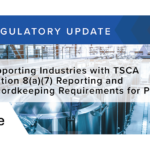
Environmental compliance auditing plays a crucial role in ensuring that businesses in Lewisville adhere to local regulations and operate in an environmentally responsible manner. By conducting comprehensive audits, companies can identify areas of non-compliance and take corrective actions to mitigate risks and protect the environment. In this article, we will explore the definition, importance, and key components of environmental compliance auditing, as well as its role in Lewisville, the auditing process, challenges faced, and future trends in this field.
Understanding Environmental Compliance Auditing
Before delving into the intricacies of environmental compliance auditing, let us establish a clear understanding of its definition and importance. Environmental compliance auditing refers to the systematic assessment of an organization’s activities, processes, and facilities to ensure adherence to environmental regulations and standards.
Compliance auditing helps businesses identify potential non-compliance issues and assess the effectiveness of their environmental management systems. It also provides an opportunity to improve operational efficiency, reduce environmental risks and liabilities, and enhance the organization’s reputation.
Definition and Importance of Environmental Compliance Auditing
Environmental compliance auditing involves the evaluation of a company’s compliance with local, state, and federal environmental laws, such as air quality regulations, water management requirements, waste disposal guidelines, and hazardous material handling protocols. Through auditing, organizations can identify and rectify non-compliance issues, reduce environmental impact, and minimize penalties.
Key Components of an Environmental Compliance Audit
An environmental compliance audit typically includes several key components to assess an organization’s environmental performance. These components may include:
- Reviewing permits, licenses, and regulatory requirements
- Inspecting facilities, equipment, and operational practices
- Evaluating environmental management systems
- Analyzing data and records related to emissions, waste, and resource consumption
- Assessing training programs and awareness of environmental responsibilities
Reviewing permits, licenses, and regulatory requirements is an essential part of an environmental compliance audit. This involves examining the documentation that grants the organization permission to operate and ensuring that all necessary permits and licenses are up to date. By reviewing these documents, auditors can verify that the company is operating within the legal framework and meeting all regulatory requirements.
Inspecting facilities, equipment, and operational practices is another crucial component of an environmental compliance audit. Auditors conduct physical inspections to assess the condition of the organization’s facilities and equipment, ensuring that they are properly maintained and meet environmental standards. They also evaluate operational practices to identify any potential sources of environmental pollution or non-compliance.
Evaluating environmental management systems is an integral part of the audit process. This involves assessing the organization’s policies, procedures, and practices related to environmental management. Auditors review the effectiveness of these systems in ensuring compliance with environmental regulations and identify areas for improvement.
Analyzing data and records related to emissions, waste, and resource consumption provides valuable insights into the organization’s environmental performance. Auditors examine data on emissions, waste generation, and resource consumption to determine if the company is meeting regulatory requirements and identify opportunities for reducing environmental impact.
Assessing training programs and awareness of environmental responsibilities is crucial for ensuring that employees are knowledgeable about environmental regulations and their roles in compliance. Auditors evaluate the organization’s training programs and assess the level of awareness among employees regarding their environmental responsibilities. This helps identify any gaps in training and awareness that need to be addressed.
By including these key components in an environmental compliance audit, organizations can gain a comprehensive understanding of their environmental performance and identify areas for improvement. This proactive approach not only helps businesses comply with regulations but also promotes sustainable practices and protects the environment for future generations.
The Role of Environmental Compliance Auditing in Lewisville
As a city known for its commitment to sustainability and environmental stewardship, Lewisville places great importance on environmental compliance auditing. The city has implemented local regulations to protect its unique ecosystems, air quality, water resources, and overall environmental well-being.
Local Environmental Regulations in Lewisville
Lewisville has set specific regulations to ensure businesses operate within environmentally responsible parameters. These regulations may include limitations on emissions, waste management protocols, water usage restrictions, and specific measures to protect local flora and fauna.
Environmental compliance auditing plays a vital role in ensuring that businesses comply with these regulations, preventing adverse environmental impacts and preserving the city’s natural resources.
Impact of Environmental Compliance on Lewisville Businesses
Complying with environmental regulations is not only a legal obligation but also a business necessity in Lewisville. Adhering to these regulations enhances the reputation of businesses, fosters positive stakeholder relationships, attracts environmentally conscious customers, and creates a competitive advantage in the market.
Moreover, by implementing sustainable practices and reducing their environmental footprint, businesses in Lewisville contribute to the overall well-being of the community and demonstrate their commitment to environmental stewardship.
The Process of Environmental Compliance Auditing
The process of environmental compliance auditing involves several stages, including pre-audit activities, conducting the actual audit, and post-audit activities. Each stage plays a crucial role in ensuring a comprehensive and effective audit.
Pre-Audit Activities
Prior to the audit, organizations must conduct thorough preparatory work. This includes reviewing applicable regulations, permits, and licenses, organizing relevant data and documentation, identifying potential areas of non-compliance, and establishing audit objectives and scope.
Organizations may also choose to develop an audit plan, outlining the specific procedures, timelines, and personnel responsible for carrying out the audit. Effective pre-audit activities set the foundation for a smooth and productive audit process.
Conducting the Audit
During the audit, auditors systematically assess the organization’s compliance with applicable environmental regulations and standards. This typically involves site inspections, interviews with staff members, review of records and documentation, and data analysis.
Auditors may use checklists, sampling methods, and performance indicators to evaluate various aspects of environmental compliance, including emissions, waste management, hazardous material handling, and resource conservation. The audit process may vary depending on the nature of the business and the specific regulatory requirements.
Post-Audit Activities
Following the completion of the audit, organizations must undertake post-audit activities to address non-compliance issues and improve their environmental performance. This includes identifying corrective actions, developing action plans, assigning responsible personnel, establishing timelines for implementation, and monitoring the progress made.
The post-audit phase also involves documenting audit findings and recommendations, preparing audit reports, and communicating the results to relevant stakeholders. Organizations may use the audit outcomes to enhance their environmental management systems and establish a continuous improvement cycle.
Challenges in Environmental Compliance Auditing
Despite the numerous benefits it offers, environmental compliance auditing can present challenges for businesses and auditors alike. Recognizing these challenges is crucial for developing effective auditing strategies and overcoming obstacles.
Common Obstacles in Compliance Auditing
Some common challenges in environmental compliance auditing include:
- Complexity and frequent changes in environmental regulations
- Lack of comprehensive data and documentation
- Inadequate resources and budget constraints
- Varying interpretations of regulations and compliance requirements
- Resistance to change and lack of commitment from organizational stakeholders
Overcoming Auditing Challenges
To overcome these challenges, organizations can adopt various strategies, such as:
- Staying updated on regulatory changes through regular monitoring and engagement with relevant authorities
- Implementing robust data management systems and ensuring accurate and accessible documentation
- Allocating sufficient resources for auditing activities, including personnel, training, and technology
- Seeking expert advice and guidance to interpret complex regulations and compliance requirements
- Cultivating a culture of environmental responsibility and engaging employees at all levels
Future Trends in Environmental Compliance Auditing
The field of environmental compliance auditing is continuously evolving, driven by advancements in technology and changes in environmental regulations. As we look towards the future, several trends are likely to shape the landscape of compliance auditing.
Technological Advancements in Auditing
New technologies, such as remote sensing, drones, artificial intelligence, and data analytics, are revolutionizing the way audits are conducted. These advancements enable more efficient data collection, real-time monitoring, automated compliance tracking, and enhanced analysis of complex environmental data sets.
By leveraging these technologies, organizations can streamline their auditing processes, improve accuracy, and gain valuable insights into their environmental performance.
Evolving Environmental Regulations and Their Impact on Auditing
As environmental regulations continue to evolve, auditors will need to stay updated on shifting compliance requirements and emerging environmental issues. Climate change, sustainable development goals, and societal expectations will shape future regulations, leading to increased scrutiny of business practices and environmental performance.
Auditors will play a crucial role in helping organizations navigate these changing regulatory landscapes and ensuring ongoing compliance with emerging environmental standards.
In conclusion, environmental compliance auditing holds immense significance in Lewisville, where businesses are dedicated to upholding local environmental regulations and embracing sustainable practices. By conducting thorough audits, organizations can identify areas of non-compliance, take corrective actions, and improve their overall environmental performance. While auditing may present challenges, these can be overcome through effective strategies and a commitment to continuous improvement. As technology and regulations evolve, environmental compliance auditing will continue to evolve, playing a pivotal role in promoting environmental responsibility in Lewisville and beyond.
As environmental regulations evolve and the need for comprehensive compliance auditing grows, ESE Partners stands ready to assist businesses in Lewisville and beyond. Our team of environmental engineers and scientists specializes in navigating the complexities of environmental challenges, ensuring your business remains ahead of regulatory changes and committed to sustainability. With a promise to deliver opportunity and improve community quality of life, ESE Partners offers innovative solutions in due diligence, remediation, compliance, and more. If you’re seeking to enhance your environmental performance and ensure compliance, Request A Proposal from ESE Partners today and take a proactive step towards responsible business growth.








